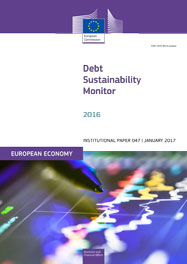Eichengreen, Barry, (2017), “The Age Of Hyper-Uncertainty”, Social Europe, 9 January The year 2017 will mark the 40th anniversary of the publication of John Kenneth Galbraith’s The Age of Uncertainty. Forty years is a long time, but it is worth looking back and reminding ourselves of how much Galbraith and his readers had to be uncertain about. In 1977, as Galbraith was writing, the world was still reeling from the effects …Read More
Debt Sustainability Monitor 2016
European Commission, (2017), “Debt Sustainability Monitor 2016”, European Commission, January 2017 The economic and financial crisis has left a legacy of high public debt burdens in a number of EU countries, in some cases accompanied by contemporaneously high debt in the private sector, thus making deleveraging more difficult. Furthermore, the current macroeconomic context of moderate GDP growth and very low inflation (well below the ECB objective of below but close …Read More
Can the EU survive in an age of populism?
Gros, Daniel, (2017), “Can the EU survive in an age of populism?”, CEPS, 9 January Despite the formidable threats currently facing the EU, Daniel Gros offers reassurances that its multi-level democracy and open economy will become more attractive again once the populists fail to deliver and weakened checks and balances lead to excesses. Another year has passed and another threat to the existence of the European Union is looming. The …Read More
The future of central bank independence: Results of the CFM–CEPR Survey
Den Haan, Wouter, Ellison, Martin, Ilzetzki, Ethan, McMahon, Michael , Reis, Ricardo, (2017), “The future of central bank independence: Results of the CFM–CEPR Survey”, VoxEu, 10 Ιανουαρίου Over the past 30 years, most central banks across the advanced economies have been given the ability to conduct monetary policy independently from interference by fiscal and political authorities. The latest Centre for Macroeconomics and CEPR expert survey invited views on whether this era …Read More
ECB finally addressing Italian bank woes
Véron, Nicolas, (2017), “ECB finally addressing Italian bank woes”, Bruegel, 4 January Most of Italy’s banks, many of which are small and local, have politicized governance features that blur commercial incentives. As a consequence, they were unable to rein in their lending during the downturn of the late 2000s. Many of these loans turned sour in subsequent years and local connections prevented the banks from working them out, so they …Read More
Taxation of temporary jobs: Good intentions but bad outcomes
Cahuc, Pierre, Charlot, Olivier, Malherbet, Franck, Benghalem, Hélène, Limon, Emeline, (2017), “Taxation of temporary jobs: Good intentions but bad outcomes”, VoxEu, 5 January Temporary job contracts account for a substantial proportion of the workforce in countries such as France and Spain, but they can result in high job turnover and instability. This column assesses the impact of government policies that impose taxes on temporary contracts to induce employers to lengthen …Read More
What will drive political uncertainty in 2017?
Wolff, Guntram B., (2017), “What will drive political uncertainty in 2017?”, Bruegel, 3 January 2017 promises to be another challenging year for Europe’s liberal democracies. The EU is facing three, or even four, elections in major member states. The Netherlands, France, Germany and possibly also Italy will go to the polls. The results of all four elections are far from certain at this stage. Indeed, voting behaviour seems to have …Read More
Approaches to the labour market integration of refugees and asylum seekers
Foti, Klara, Fromm, Andrea, (2016), “Approaches to the labour market integration of refugees and asylum seekers”, Eurofound, December Providing swift access to the labour markets of host countries is part of the solution to Europe’s refugee crisis. This report takes forward existing research on the labour market integration of refugees (those with the officially recognised status of international protection) and asylum seekers (those who have applied for international protection and …Read More
Doves, hawks … and pigeons: Why central bankers like monetary policy inertia
Masciandaro, Donato, (2017), “Doves, hawks … and pigeons: Why central bankers like monetary policy inertia”, VoxEu, 2 January The discussion of the delayed lift-off in US monetary policy is just the latest episode in a long-lasting debate over the causes of inertia in monetary policy. This column approaches the issue by assuming that psychological drivers can influence the decisions of central bankers. Loss aversion is one source of behavioural bias …Read More
Unusual outcomes and uncertain times
Kozeniauskas, Nicholas, Veldkamp, Laura, (2017), “Unusual outcomes and uncertain times”, VoxEu, 3 January Uncertainty shocks are a major avenue of research in the quest to explain business cycles, as well as asset prices and financial crises. This column argues that three conceptually distinct types of uncertainty that are often modelled independently – ‘macro’ uncertainty about an aggregate variable such as GDP, ‘micro’ uncertainty about firms’ individual outcomes, and ‘higher-order’ uncertainty …Read More





